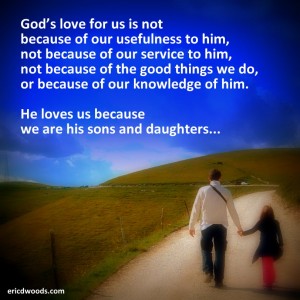 The Bible makes several comparisons of life events to our relationship with God…
The Bible makes several comparisons of life events to our relationship with God…
Ephesians 5:25, for example, says, “Husbands, love your wives, as Christ loved the church and gave himself up for her…”
I remember reading this as a kid, and studying it in 5th grade Sunday school class—true story. But I can safely say that my understanding of this passage has changed as time has passed, especially in my married life.
What does it mean to give myself up for my wife? Our understanding of the depth of sacrifice Christ made for us changes when we marry.
Matthew 7:9-11 says, “9Which of you, if your son asks for bread, will give him a stone? 10 Or if he asks for a fish, will give him a snake? 11 If you, then, though you are evil, know how to give good gifts to your children, how much more will your Father in heaven give good gifts to those who ask him!”
As a child, with parents, I knew that they sincerely wanted to give me all the good things they could. But, when I became a parent, my perspective changed. To be on the giving end of this relationship helped me to understand the longing, the desire, of a father to bless his children with things that are truly good in life.
When our first foster child became a part of our family, and truly that was our intention… not just to have a guest in our home, but to treat her as our own… we gained additional perspective.
I remember what I thought about the first time she called me daddy.
Romans 8:14-17 says, “14 For those who are led by the Spirit of God are the children of God. 15 The Spirit you received does not make you slaves, so that you live in fear again; rather, the Spirit you received brought about your adoption to sonship. And by him we cry, “Abba, Father.” 16 The Spirit himself testifies with our spirit that we are God’s children. 17 Now if we are children, then we are heirs—heirs of God and co-heirs with Christ, if indeed we share in his sufferings in order that we may also share in his glory.”
I had memorized all of Romans 8 during an internship, but there’s a gap between knowledge and the kind of understanding you gain with experience. Unless you’ve been adopted—and I haven’t—or you’ve welcomed a child into your home as one of your own, this passage may just be words. It had been to me.
I understood what it said, but now I understood what it may feel like to God when we relate to him, not as slaves or servants, but as children. When we call him Daddy, all of his loving, all of his patience, all of his holding us in his loving arms… it pays off.
And now I knew what it felt like too—at least a little—to love and wait and hug and hold, and to have a child skin her knee and cry out for Daddy, and to know she meant me.
God’s love for us is not because of our usefulness to him, not because of our service to him, not because of the good things we do, or because of our knowledge of him. He loves us because we are his sons and daughters, and he will continue to love us until we turn to him like a child, and cry out, Abba, Father… and long thereafter.